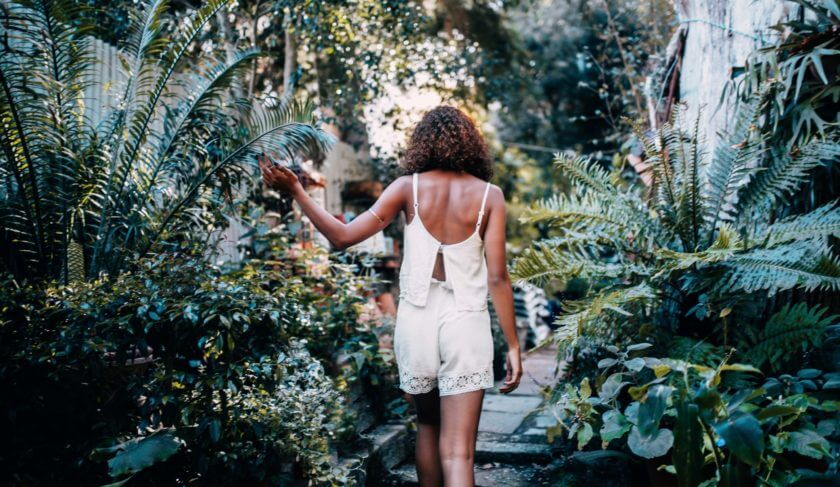
There’s nothing like the taste of fresh produce and the vibrancy of fresh flowers, but being a successful gardener takes a lot of time and money. But there are ways to grow green at an affordable price. Kofi Thomas, who last November discussed his popular Brooklyn-based “Good Life Garden” on the Ellen show, has become a self-taught expert on all things green and flourishing — even in the face of extreme space constraints.
When Thomas decided to create a community garden in the Bushwick section of Brooklyn, originally, the purpose was to clean up a vacant space and provide healthy food for the community. “We live in what’s referred to as a food desert,” Thomas says. “I’m not aware of any affordable, healthy food options in my neighborhood, but we have a ton of immigrants with a lot of knowledge of how to farm.”
But now, with two gardens up and working and a third on the way, he’s become more than a little obsessed. But what started as a place to merely grow some fresh veggies, “turned into a healing space,” Thomas says, “where people come together to celebrate and have events. And we also have workshops on how to grow your own food and the medicinal properties of food.”
Adding to the knowledge was the diverse community around the garden. “I’m pretty lucky that I live on a street that has a lot of different generations and immigrants from all over the Caribbean, Africa, and Asia. I’ve learned a ton about gardening in a little bit of time just by watching these people from around the globe, each bringing their farming practices. I get to witness thousands of years of refined farming skills and witness the differences and similarities. Listen and pay attention and you pick up a ton of tricks and skills.”
Thomas’s Good Life Garden grows tomatoes, cucumbers, collard greens and watermelon, among other crops, and food is distributed free, first to the senior center across the street and then to volunteers from the neighborhood. The winter is a time for leafy greens, which survive better in the cold. The garden also grows a lot of herbs and flowers. (If you would like to contribute to the Good Life Garden’s GoFundMe page, go here.)
“The herbs are important to cultural identity,” Thomas says. “They’re amazing seasonings for sure, but herbs are also a major source of medicine for our immigrant community – the things that grandma passed down.”
The best tips for gardeners who don’t want to spend a fortune
- When you go to a garden store, before you buy a plant look it up on your phone. Is this a good plant for the zone you live in?
- Make sure the plants you purchase have a healthy root system.
- When you’re buying seedlings, check the cups. Each of the cups is the same price but some cups may have more than one seedling, so you’ll get more plants for the price of one.
- Talk to your neighbors. People usually buy extra plants and you may be able to organize a swap.
- Look to your community for free resources. Tree-trimming companies may have wood chips to spare, community gardens and farms may have extra soil and seedlings.
- Look for neighbors who garden to share purchases and your produce.
And if you live in an apartment…
- The key thing to know is whether the plant needs to be pollinated. If it needs to be pollinated, it probably needs to be outdoors.
- Microgreens are a super popular, healthy choice for growing in an apartment. You can cut them off, add them to your salad and they grow right back.
- Check your soil for aphids (those pesky bugs that ruin your indoor tomatoes and strawberries). Spray your plants. Try neem oil or Dr. Bronner’s soap. If you’ve tried all of those things and the bugs still come back, take the plants outside, shake off all of the dirt, clean the plants and roots and start with fresh soil.
- Repurpose glass containers into windowsill plant holders.
Thomas says that one of the best results of farming and gardening with people from other cultures is that you not only learn about other techniques, but about other foods. “When people see a different fruit, their eyes light up,” he says. “it sparks this curiosity.”
Growing one’s own food, especially in a place like Brooklyn where it’s not expected, saves money and provides fresher, healthier, tastier produce. “If something goes wrong with the food supply chain, we’re not as vulnerable,” he says. “And we have access to more than processed foods. Our community suffers from higher levels of diabetes and hypertension and all types of heart disease. If we can start eating better, it will give us more energy, make us happier people and extend our lives. It may also make us more social. This neighbor’s growing carrots, another’s growing strawberries, and now we’re sharing and talking to each other.”
More from HerMoney:
- 6 Ways to Find the Groceries You Need When Shelves are Empty
- 9 Things Most of Us Don’t Do at the Grocery Store But Could Save Us $100 or More
- Podcast: The Lazy Woman’s Guide to Cooking With Melissa Clark
Looking for more financial insights delivered right to your inbox? Subscribe to HerMoney today!







